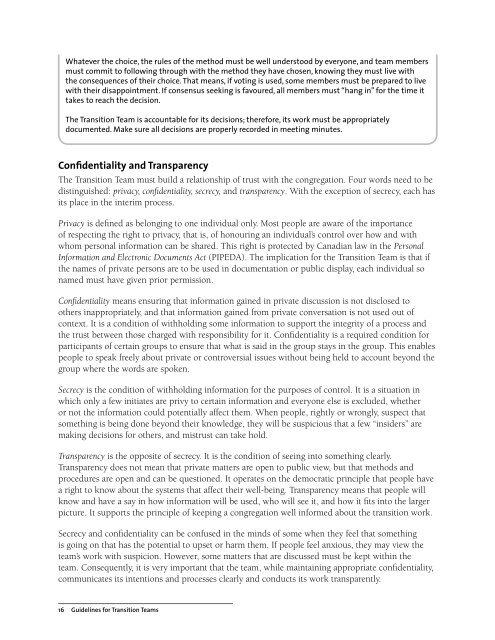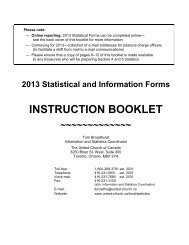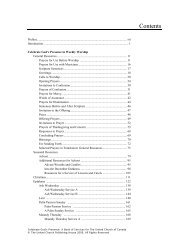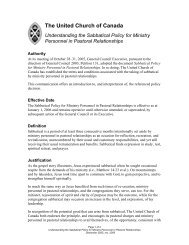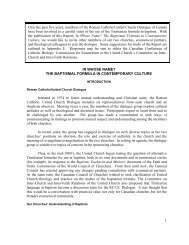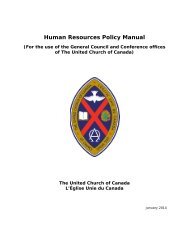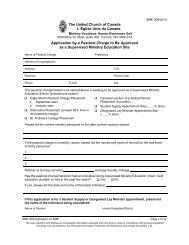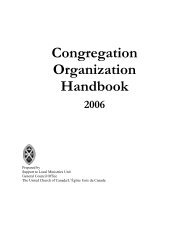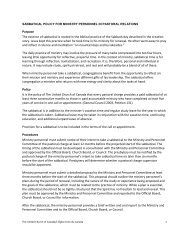Guidelines for Transition Teams - The United Church of Canada
Guidelines for Transition Teams - The United Church of Canada
Guidelines for Transition Teams - The United Church of Canada
You also want an ePaper? Increase the reach of your titles
YUMPU automatically turns print PDFs into web optimized ePapers that Google loves.
Whatever the choice, the rules <strong>of</strong> the method must be well understood by everyone, and team members<br />
must commit to following through with the method they have chosen, knowing they must live with<br />
the consequences <strong>of</strong> their choice. That means, if voting is used, some members must be prepared to live<br />
with their disappointment. If consensus seeking is favoured, all members must “hang in” <strong>for</strong> the time it<br />
takes to reach the decision.<br />
<strong>The</strong> <strong>Transition</strong> Team is accountable <strong>for</strong> its decisions; there<strong>for</strong>e, its work must be appropriately<br />
documented. Make sure all decisions are properly recorded in meeting minutes.<br />
Confidentiality and Transparency<br />
<strong>The</strong> <strong>Transition</strong> Team must build a relationship <strong>of</strong> trust with the congregation. Four words need to be<br />
distinguished: privacy, confidentiality, secrecy, and transparency. With the exception <strong>of</strong> secrecy, each has<br />
its place in the interim process.<br />
Privacy is defined as belonging to one individual only. Most people are aware <strong>of</strong> the importance<br />
<strong>of</strong> respecting the right to privacy, that is, <strong>of</strong> honouring an individual’s control over how and with<br />
whom personal in<strong>for</strong>mation can be shared. This right is protected by Canadian law in the Personal<br />
In<strong>for</strong>mation and Electronic Documents Act (PIPEDA). <strong>The</strong> implication <strong>for</strong> the <strong>Transition</strong> Team is that if<br />
the names <strong>of</strong> private persons are to be used in documentation or public display, each individual so<br />
named must have given prior permission.<br />
Confidentiality means ensuring that in<strong>for</strong>mation gained in private discussion is not disclosed to<br />
others inappropriately, and that in<strong>for</strong>mation gained from private conversation is not used out <strong>of</strong><br />
context. It is a condition <strong>of</strong> withholding some in<strong>for</strong>mation to support the integrity <strong>of</strong> a process and<br />
the trust between those charged with responsibility <strong>for</strong> it. Confidentiality is a required condition <strong>for</strong><br />
participants <strong>of</strong> certain groups to ensure that what is said in the group stays in the group. This enables<br />
people to speak freely about private or controversial issues without being held to account beyond the<br />
group where the words are spoken.<br />
Secrecy is the condition <strong>of</strong> withholding in<strong>for</strong>mation <strong>for</strong> the purposes <strong>of</strong> control. It is a situation in<br />
which only a few initiates are privy to certain in<strong>for</strong>mation and everyone else is excluded, whether<br />
or not the in<strong>for</strong>mation could potentially affect them. When people, rightly or wrongly, suspect that<br />
something is being done beyond their knowledge, they will be suspicious that a few “insiders” are<br />
making decisions <strong>for</strong> others, and mistrust can take hold.<br />
Transparency is the opposite <strong>of</strong> secrecy. It is the condition <strong>of</strong> seeing into something clearly.<br />
Transparency does not mean that private matters are open to public view, but that methods and<br />
procedures are open and can be questioned. It operates on the democratic principle that people have<br />
a right to know about the systems that affect their well-being. Transparency means that people will<br />
know and have a say in how in<strong>for</strong>mation will be used, who will see it, and how it fits into the larger<br />
picture. It supports the principle <strong>of</strong> keeping a congregation well in<strong>for</strong>med about the transition work.<br />
Secrecy and confidentiality can be confused in the minds <strong>of</strong> some when they feel that something<br />
is going on that has the potential to upset or harm them. If people feel anxious, they may view the<br />
team’s work with suspicion. However, some matters that are discussed must be kept within the<br />
team. Consequently, it is very important that the team, while maintaining appropriate confidentiality,<br />
communicates its intentions and processes clearly and conducts its work transparently.<br />
16 <strong>Guidelines</strong> <strong>for</strong> <strong>Transition</strong> <strong>Teams</strong>


